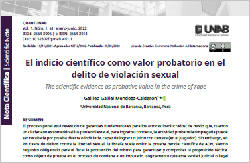The Scientific evidence as probative value in the crime of rape
DOI:
https://doi.org/10.52807/qunab.v1i1.1Keywords:
in dubio pro reo, jus puniendi, scientific expert evidence, factual propositionAbstract
The criminal process is covered with fundamental guarantees for the actors involved, so that when a citizen is subjected to the state ius puniendi, to achieve his conviction, the evidentiary activity deployed can be collected by direct or circumstantial evidence, capable of achieving a trial with certainty (in the judge). However, in cases of crimes against sexual freedom, the Prosecutor's Office usually omits the expert scientific DNA test, being a mandatory requirement for the prosecutor to produce it, guaranteeing and verifying the factual proposition, as an object of evidence in the process. conviction of an accused. Logically, this judicial or legal truth displayed in the oral trial must undermine the presumption of innocence or the principle of in dubio pro indictment (doubt favors the accused), or in all establish criminal responsibility, that in both cases, the acquittal o conviction must explain the reasons or the reasons on which the judicial decision is based in one way or another; and that there are no false convictions or false acquittals, especially in this type of crime.
References
Cabrera Freyre, A. R. P. (2011). Manual de Derecho Procesal Penal (1st ed.). Editora y distribuidora Ediciones Legales E.I.R.L.
Campos-Meza, S., Chamoli Falcón, A. W., Meneses Jara, P. W., Campos Salvatierra, O., & Mendoza Calderón, G. G. (2021). Latin American Criminal Law: a review of present and future perspectives. Turkish Online Journal of Qualitative Inquiry, 12(9). https://www.tojqi.net/index.php/journal/article/view/6058
Carrasco Rufasto, E, & Cayatopa Díaz, G. A. (2009). Institucionalización de la defensoría de oficio en el Perú: una visión sistémica distrito judicial de Lambayeque. Universidad Señor de Sipán. https://repositorio.uss.edu.pe/handle/20.500.12802/1898
Corte Suprema de Justicia del Perú. (2022). Casación N° 005-2021-Puno. Sala Penal Permanente. Puno: 29 de abril del 2022
Corte Suprema de Justicia del Perú. (2021). Revisión de Sentencia N° 487-2018-Lima. Sala Penal Transitoria. Puno: 30 de septiembre del 2021
Corte Suprema de Justicia del Perú. (2019). Recurso de Nulidad N° 1446-2018-Apurimac. Sala Penal Transitoria. Apurimac: 17 de mayo del 2019
Corte Suprema de Justicia del Perú. (2016). Casación N° 292-2014-Ancash. Sala Penal Permanente. Ancash: 17 de febrero del 2016
Corte Suprema de Justicia del Perú. (2016). Recurso de Nulidad N° 1875-2015-Junín. Sala Penal Transitoria. Junin: 12 de enero del 2016
Corte Suprema de Justicia del Perú. (2005). Recurso de Nulidad N° 1912-2005-Piura. Sala Penal Permanente. Piura: 6 de setiembre del 2005
Guevara Vásquez, I. (2018). El estándar probatorio y los niveles del conocimiento a raíz de la Sentencia Plenaria Casatoria N° 1-2017/CIJ-433. Actualidad Penal, 1(45), 6381.
López Palma, A. (2021). ¿En qué consiste la prueba por indicios? ZH Consultores. https://www.zhconsultoresperu.com/articulo/en-que-consiste-la-prueba-por-indicios/
Moyano Muñoz, J. J. A., Barbery M., D., González Araya, F., Mendoza Calderón, G. G., Quiñones-Flores, M. M., & Ruiz Peralta, K. A. (2022). Covid 19 and higher eduation: challenges and possibilities in the transition to online education in Latin America. Journal of Language and Linguistic Studies, 18(2). https://www.jlls.org/index.php/jlls/article/view/4383
Nuevo Código Procesal Penal. (2020). Decreto Legislativo N° 957 (6th ed.). Ministerio de Justicia y Derechos Humanos. https://cdn.www.gob.pe/uploads/document/file/1850571/Código Procesal Penal Final.pdf?v=1619548796
San Martín, C. (2018). Eficacia de los elementos de convicción en el proceso por colaboración eficaz. En Asencio, J.M. y Castillo, J.L. (Eds.), Colaboración eficaz (pp. 269 - 285), Lima, Perú: Editorial Ideas.
Villafuerte, C. (2018). Indicio y prueba indiciaria. Pasión Por El Derecho. https://lpderecho.pe/indicio-prueba-indiciaria-carlos-villafuerte/
Uchasara Uchasara, B. (2018). Deficiente Investigación Fiscal, Conlleva a sentencias Absolutorias Ocasionando Impunidad en Perjuicio de los Justiciables en los Juzgados Penales de la Provincia de San Román en el año 2014. Universidad Andina Nestor Cáceres Velásquez. http://repositorio.uancv.edu.pe/handle/UANCV/1754
Zamora Zamora, J. L. (2011). La Tutela de Derechos: Instrumento de la Defensa para erradicar las Viejas Prácticas en el Nuevo Modelo Procesal Penal. Leyes, derechos y justicias. http://leyesderechoyjusticia.blogspot.com/search?q=Tutela+de+Derechos

Downloads
Published
Issue
Section
License
Copyright (c) 2022 Galileo Galilei Mendoza-Calderón

This work is licensed under a Creative Commons Attribution 4.0 International License.
© Los autores. Este artículo es publicado por la QuantUNAB de la Universidad Nacional de Barranca. Este es un artículo de acceso abierto, distribuido bajo los términos de la Licencia Creative Commons Atribución 4.0 Internacional (https://creativecommons.org/licenses/by/4.0/deed.es) que permite Compartir (copiar y redistribuir el material en cualquier medio o formato), Adaptar (remezclar, transformar y construir a partir del material) para cualquier propósito, incluso comercialmente.






